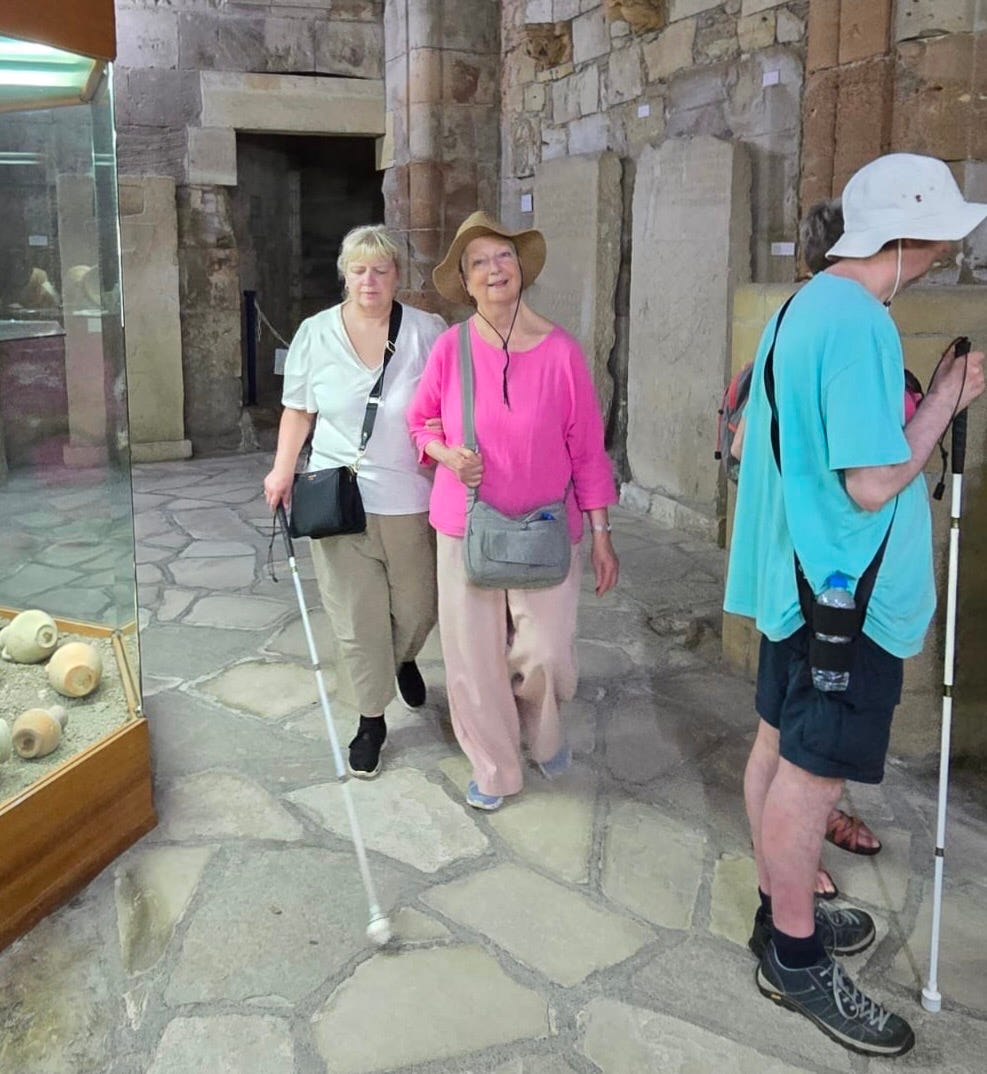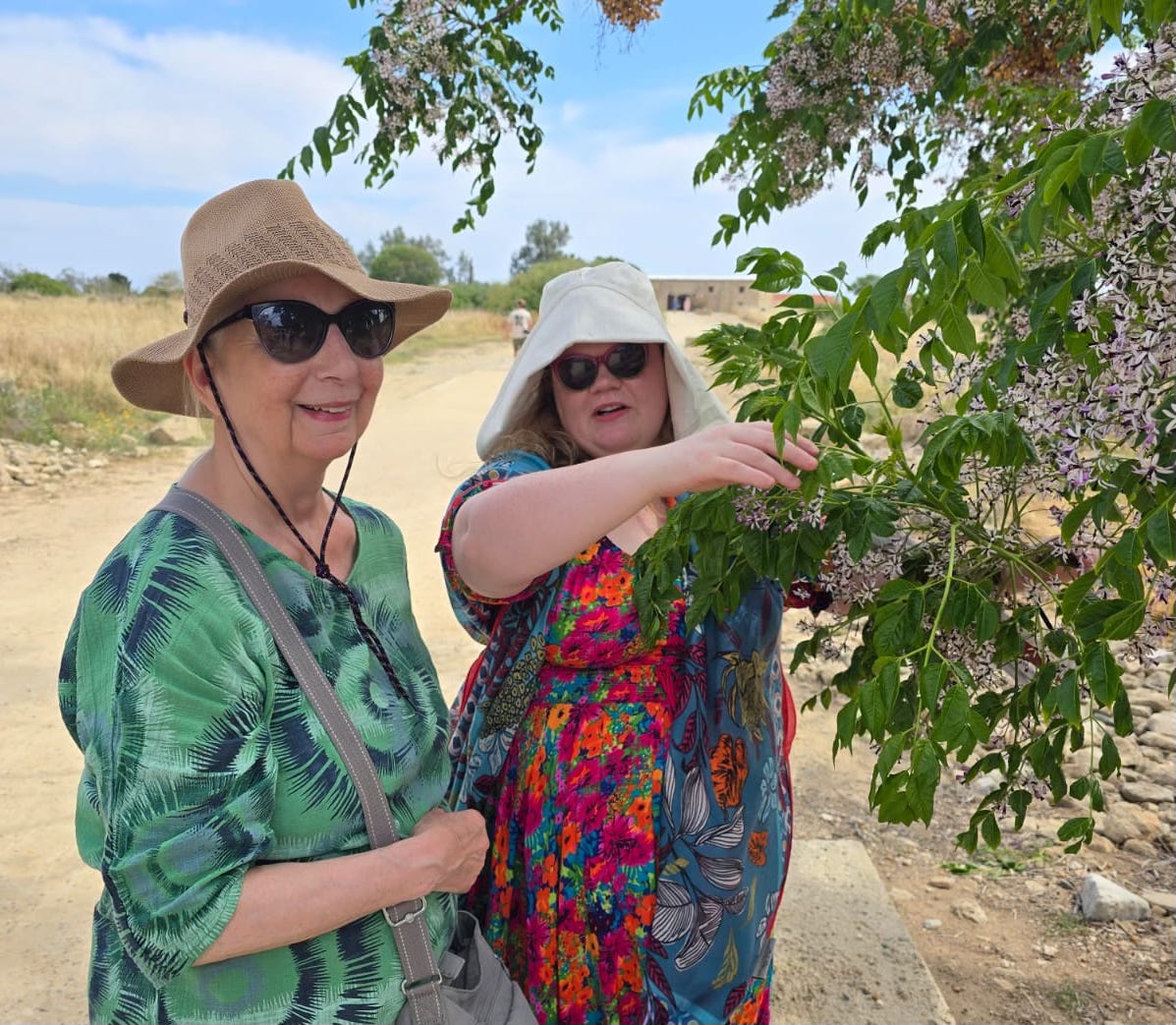Dig into the field of Place Writing with me as your guide. Discover new ways of thinking and writing about home and place.
What type of holiday will you have this year?
I recently travelled to the island of Cyprus in the Mediterranean Sea on a holiday organised by TravelEyes, a company that provides activity breaks in the UK and internationally for blind and partially sighted people. My group included ten sighted guides, (of which I was one), and eight visually impaired people, (collectively referred to as VIs). Since no-one in my circle of friends and family is blind or visually impaired, and I had never before acted as a sighted guide, it was quite a plunge into the unknown for me.
Sightseeing
We had a busy itinerary and visited all the usual sights—Limassol old town, ancient ruins, castles, mountain villages, botanic gardens. And we did all the usual things—drank coffee, sampled the local tavernas, tasted wines in a family-run vineyard, swam in the sea, danced, and shopped.
In the above photograph we stood marvelling at the ancient ruins and mosaic floors of a stately villa perched on a hillside outside Limassol; some two thousand years ago people would have lived there in a city known as Kourion. You can see the floor of the villa’s bathhouse and, reminiscent of today’s public pools, a sunken tiled area was incorporated into the design where guests could wash their feet before entering the bathing area proper.
Teamwork
Each day we were paired up with a different person, one sighted guide with one VI. And throughout the week we were allocated ‘breakfast buddies’. In this way, we spent quality time getting to know each other and no-one was left on their own at mealtimes. The arrangement gave the group a lively dynamic and an atmosphere of camaraderie soon emerged. We came together as a team and shared the most spectacular and silliest of moments. Our tour guide, who organised the pairings and counted us on and off the tour bus, made sure that we all enjoyed some rest and relaxation as well.
Sensory Perception
Each VI liked to be guided in a slightly different way and I found that most people used a cane as well as threading an arm though mine, or they used a cane in one hand and cupped my elbow with the other. This ‘light touch’ physical contact felt strange at first, then it felt natural, and it deepened trust between us.
I was in awe of the VIs’ self confidence; some strode out and moved relatively quickly through crowds and along uneven pavements with only the help of a cane. Some of the sites we visited were quite awkward to navigate because of uneven and steep steps, low arches, and narrow passageways. And on the streets, potholes in pavements and repair works occasionally made for treacherous conditions underfoot. While I was being careful not to trip I also had to ensure that the way ahead for my partner was safe. And, while casually chatting, I also had to warn of kerbs and steps ahead. And there were many!
The white cane is a clear and practical marker, universally understood, and in most cases when people see it they instantly respond and move aside on the pavement, or offer to give up their seat on public transport.
Restaurants
The food in Cyprus was often served buffet-style. A continuous stream of dishes came out from the kitchen and waiting staff miraculously found space on the table for each new plate. Meat and cheese dishes featured heavily and my hundred per cent plant-based diet caused some problems. However, all the restaurants we went to were prepared to make something that suited me and for that I was grateful. They were not inventive, however, and I ended up eating several different versions of Spaghetti with Romesco Sauce. After eight days I began to crave green leafy vegetables and planned on filling up with cabbage and spinach as soon as I got home.
The VIs were game to eat almost anything. To my shame, I’d never really thought about it before, but how do you eat a meal when you cannot see it? Most VIs used their fingers, mainly to find the food on the plate and then to put it on a fork or a spoon. And, sometimes I’d help to cut up some meat. Since I wasn’t going to be eating most of it, I had to use my sight, my sense of smell, and a little imagination when describing the food being placed on the table to my partner.
Slowing Down
During this holiday I noted that time was more elastic, it needed to stretch to accommodate basic things like walking into town, getting on a bus, visiting the sites, reading menus and eating meals. We would stop to smell and touch things, take time to listen to sounds such as boats clanking in the harbour, children playing in the parks, and water moving along gullies.
Less romantically, I would make advance checks on public toilets to ensure they were clean and serviceable for my partner, and then I would explain the layout—toilet pan ahead of you, basin to the left with soap and paper hand towels on the right etc—before leaving them to it.
This slightly slower pace suited me fine but, of course, for me this was temporary. What must it be like for partners, parents, and carers, who live full-time with VIs? No doubt, as in all relationships, patience, respect, and love goes a long way. Some said that these holidays gave them, and their partners at home, a much-needed break. And, for the VIs who live alone, some said that without this type of holiday they’d not be able to travel abroad at all.
A Learning Experience
Conversation flowed and there was a lot of laughter within the group—notably, if you want to enjoy life as a blind person it helps to have a sense of humour! I enjoyed our chats over glasses of wine in the hotel bar and was endlessly fascinated by all the stories and personal potted histories.
It would be easy to get tongue-tied when using phrases like ‘see you later’ or ‘let’s see’ but I was advised not to worry about that and speak naturally. In fact, the only vocabulary I had to think about was the white cane—it took a few days before I stopped referring to it as a ‘stick’.
Every new experience is a chance to learn, and all of this feeds into my writing. I’m now more aware and alert as to how visually impaired people cope with day-to-day living, and I can appreciate how life changes when blindness suddenly, or slowly, comes on in later life.
I was tired but exhilarated after my holiday. I reflected that it was the people, rather than the place, that made it so enjoyable.
What type of holiday will you have this year?
As always, I look forward to chatting with you in the comments.
Credits & Links:
Top photo is my own. The other two were taken by Nicola Baker, our tour guide.
TravelEyes is a commercial company and I have no affiliation with them. Inevitably, the holidays are very popular with VIs so they need more sighted guides. Give them a call if you’re interested.
If you enjoyed reading this post please give it a heart and restack. Thanks!








What an interesting sensory experience!
Fascinating!!